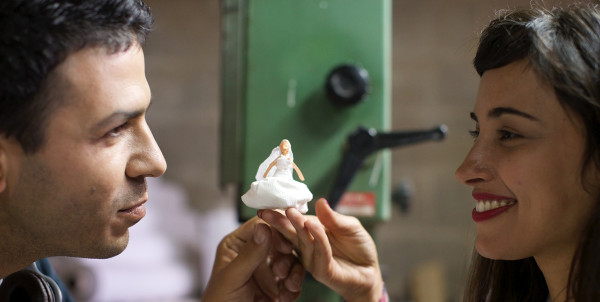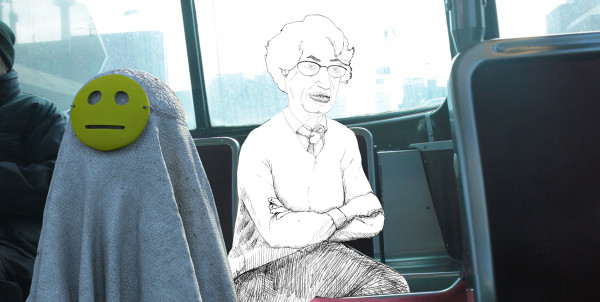Nitzan Gilady’s debut feature film, Wedding Doll, is astonishingly self-assured and profoundly poignant. Due to be screened at the Toronto International Film Festival on September 16, 18 and 20, it’s the work of a budding talent in Israeli cinema.

Hagit (Moran Rosenblatt), a mildly retarded woman of 24, is at the core of the movie. Working in a toilet paper factory in a town in the Negev Desert, she makes beautifully-crafted dolls in her spare time. The dolls, outfitted in frilly wedding gowns, speak to her desire for love, acceptance and matrimony.
A sweet, good-natured person, she sports a perpetual smile and a child-like expression. Omri (Roy Assaf), the boss’ son, likes Hagit and forms a semi-romantic relationship with her, but their chances of taking it to the next level are slim.
Hagit’s divorced mother, Sarah (Asi Levi), is fiercely protective of her daughter, who’s mocked by some as a “weirdo.” Since she’s so vulnerable, Hagit cannot be left alone at home. As a result, Sarah is virtually house-bound and is rarely able to see her boyfriend.

When the factory owner announces its imminent closure, Sarah promises to find Hagit another job. She applies for a position as a seamstress at a dress shop, but doesn’t get it. Nonetheless, she fantasizes she’ll be hired. Hagit lives in a world of illusion.
In one of the most heart-rending scenes, two of Omri’s acquaintances play a cruel joke on Hagit, who’s chastened by it.
Wedding Doll makes good use of the magnificent local scenery, and the juxtaposition between the bleak beauty of the desert and Hagit’s personal tragedy is palpable.

The performances are uniformly plausible, but Rosenblatt stands out. She’s an amazing actress who fills the screen with luminosity, intelligence and grace. Judging by her agile performance, she’s an actress whose career path seems limitless.
Gilady, too, is a special talent, and I look forward to his next film.
***
Two Israeli films are featured in the festival’s Short Cuts program — Latchkey Kids by Elad Goldman and One Last Night by Kerem Blumberg.
As One Last Night opens, two lesbians, Noa and Orr, are in the throes of love-making before Orr’s departure to Berlin. In the midst of exchanging affection, Noa says, “I wish I could stay like this forever.”
The scene shifts to a party where the women drink beer and listen to punk music. Orr, brash and outspoken, proclaims she’s glad to be leaving Israel. In a scuffle with police outside the club, the pair are arrested on a charge of possessing illegal substances. While in jail, Orr engages racy banter with a policewoman. Noa and Orr part ways at Tel Aviv’s central train station, their bond intact.

Starring Michal Korman and Agam Schuster, One Last Night distills the scrambled passions and emotions of friends and lovers on the verge of being separated.
Latchkey Kids explores an odd sibling relationship defined by love, insecurity and jealousy. Brother and sister Gur and Daniel live by themselves in an immaculately-furnished house. Their parents are no where to be seen. What is going on? The pieces in the puzzle never merge, prompting head scratching and perhaps even confusion. The lead actors are Yoav Rottman and Gaia Shalita-Katz.
***
Sol Friedman’s partially animated Canadian film, Bacon & God’s Wrath, has an endearing feel to it. Razie, a 90-year-old Jewish woman from an observant family, wants to taste bacon for the first time. She has her heart set on a bacon-and-tomato sandwich, but is torn between desire and loyalty to tradition. As she ponders how to resolve her dilemma, she briefly recalls her family history, her discovery of the Internet and her loss of faith in Orthodox Judaism.

